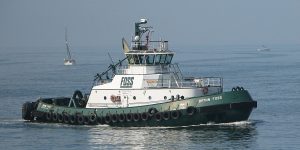6 Ways to Prevent Carbon Monoxide Poisoning Aboard Vessels
 Carbon Monoxide poisoning is often associated with automobiles and homes, but carbon monoxide poisoning can happen in any enclosed or partially enclosed space where fumes and gasses are allowed to accumulate, making fishing boats, tugboats, and other commercial vessels particularly vulnerable if not properly maintained.
Carbon Monoxide poisoning is often associated with automobiles and homes, but carbon monoxide poisoning can happen in any enclosed or partially enclosed space where fumes and gasses are allowed to accumulate, making fishing boats, tugboats, and other commercial vessels particularly vulnerable if not properly maintained.
Carbon monoxide (CO), is an odorless and colorless gas that can poison, cause long term health issues, and even kill a person who inhales too much of it. According to the CDC, approximately 430 people die from accidental CO poisoning in the U.S. each year, and 50,000 people require emergency medical attention due to accidental CO poisoning.
Symptoms of Carbon Monoxide Poisoning
 Maritime Injury Law Blog
Maritime Injury Law Blog











